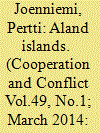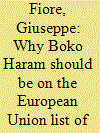|
|
|
Sort Order |
|
|
|
Items / Page
|
|
|
|
|
|
|
| Srl | Item |
| 1 |
ID:
129442


|
|
|
|
|
| Publication |
2014.
|
| Summary/Abstract |
The Åland Islands received their co-sovereign standing from the League of Nations in 1921, the settlement of a Finnish-Swedish dispute. The clash was over ownership, and the league advocated that Åland should remain part of Finland, albeit elevated to the status of a self-governing polity. The verdict implied that Finland's sovereignty was significantly compromised, whereas the islands landed in an in-between situation, being neither local nor fully sovereign. The duality of Åland - remaining an integral part of Finland yet still distinct with a standing of its own, including various cultural and linguistic safeguards - meant more generally that the islands fall through the interstices of the dominant discourses pertaining to political space. However, the lack of any clear conceptual standing has not amounted to anything profoundly disadvantageous. Their liminal nature of being neither this nor that has instead furnished the islands with a rather favourable posture. Their standing, although initially perceived as a loss and still seen in some interventions as unwarranted and viewed as a source of ontological uncertainty, arguably accounts for their ability to transform what usually appears as weakness into a considerable degree of influence. The article thus aims to explore what explains such an outcome and the manner in which the ambiguity of the islands has stood the test of time, taking into account that their standing has, among other things, been impacted by Finland and the islands both joining the EU in 1995 and the sovereignty games involved.
|
|
|
|
|
|
|
|
|
|
|
|
|
|
|
|
| 2 |
ID:
124793


|
|
|
|
|
| Publication |
2013.
|
| Summary/Abstract |
Sebastian Rosato's admirably provocative Europe United retells the origins of the European Union (EU) as a realist story of the balance of power. While he deserves praise for a bold attempt to extend offensive realism into history's greatest instance of international cooperation, the book ultimately reads as a cautionary methodological tale about how not to support a realist argument. Realist theory has been influential mainly because it offers strong expectations about major patterns in the world-relatively unitary decision-making within states and specific kinds of foreign policies between them-but Rosato's evidence focuses on a thin version of process. He selectively cites leaders' statements about their policy choices across the story, providing no leverage on how these statements related to patterned interests within or across countries. Interestingly, a similar error weakens work by the most salient IR scholar writing on EU history, Andrew Moravcsik. Their shared problems hint at a pattern of IR scholars overlooking patterns in historical evidence.
|
|
|
|
|
|
|
|
|
|
|
|
|
|
|
|
| 3 |
ID:
129503


|
|
|
|
|
| Publication |
2014.
|
| Summary/Abstract |
In the course of the last few years, the Islamic sect Boko Haram has become of great interest to academics, researchers and analysts. At the same time, experts, especially at the European Union (EU) level, have been reluctant to include Boko Haram in the EU list of terrorist organisations, despite the fact that this group has clearly demonstrated its transformation into a terrorist organisation. Security challenges and threats are, by definition, subject to change, and it is the task of security institutions to create policies to address these challenges and threats. Terrorism cannot be addressed in isolation, and policymakers are confronted at all levels with the difficult task of making sense of this evolution. By assessing the current security situation in Nigeria, this commentary tries to ascertain the potential repercussions to regional stability from the Boko Haram phenomenon. Insurgencies have often been initiated from and supported by neighbouring countries and have expanded conflicts across borders. Countering Boko Haram will require various institutions to conduct similar and concurrent counter-insurgent and counter-terrorist operations. At the global level, such co-ordination has often proven difficult. The EU has to keep the pace in this case.
|
|
|
|
|
|
|
|
|
|
|
|
|
|
|
|
|
|
|
|
|